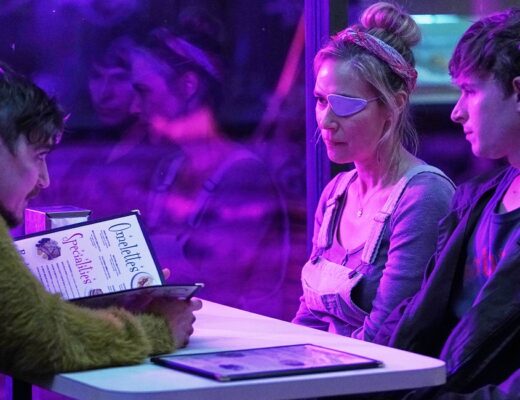With Yannick, filmmaker and absurdist Quentin Dupieux has synthesized the irreverent, a product of his usual gags and conceits, and the satirical, afforded by his latest’s one-act, one-location approximation of reality. But it would be inaccurate to say that he has settled down. The entirety of Yannick — running at an exact sixty minutes, sans credits — takes place in a Parisian theater, one without the sophistication of the opera or Shakespeare, but stuffily bougie nonetheless. A lighthearted cuckold comedy (called The Cuckold) is being staged, and actors Paul (Pio Marmaï), Sophie (Blanche Gardin), and William (Sébastien Chassagne) deliver with powerful competence the conflict among the cuck, cheater, and incontinent bull respectively. It’s neither low art nor bad taste, but the one-liners they lobby around for the audience’s amusement inspire less revelation than they do polite, anticipated laughter. Clearly, inoffensiveness prevails.
This inoffensiveness is intentionally blunt and serves almost as a strawman, for just five minutes into the film, a man from the audience stands up and derails the stage proceedings. Yannick (Raphaël Quenard), self-proclaimed night watchman and self-righteous in his views about the role and nature of art, adopts the physiognomy of Norman Rockwell’s Freedom of Speech figure (as noted by critic Michael Sicinski) while channeling the irksome acuity of Socrates. This is, of course, mostly a first impression, and once the actors have understandably heckled him out of the room and gone back to their melodramatic stage lives, this time with unkind imitations of their antagonist’s clumsy, rough-hewn mannerisms, Yannick reappears, this time with his coat and gun. The gun, he says, calls the shots literally and figuratively; his expressions now contain an undercurrent of menace, while his so-called initial upstaging goes on to be something far more inane, yet far more mysterious because.
Yannick, we see, is not quite a fully fleshed-out allegory. There are hints of Trumpian conservatism in his triumphant decrying of petit bourgeois moralism, something not entirely unjustified insofar as his critiques go against social customs but not necessarily ethical ones proper. A considerable residue from both Plato and the sophists accrues in his jabs at the troupe’s protests, and he seems to revel in their discomfort (which is, ostensibly, also our own). But this is also somebody whose lack of acting experience shows, not just through distaste for expert condescension, but strikingly through a kind of calculated naïveté. It is calculated because one could imagine Yannick playing the fool, stringing together archetypal bits from various societal strata: the low-tech working class (his limited comprehension of the computer and word processor), the cantankerous but highly articulate patron (insofar as his stubbornness in revoking social norms matches his ability to one-up his interlocutors), the secret aesthete who interprets an act of open hostility from Paul as an authentic display of bravura, etc. The point, however, is that we never quite know where sophistication and simple-mindedness meet.
This irreducibility of the film to its allegorical core makes for an enticingly uneasy experience, with Dupieux switching gears from scene to scene without sacrificing his setup’s consistent interrogation of what performance means for both performer and observer. In one moment, Yannick enjoins us to side with its titular character, fed up with the humdrum of work and then even more humdrum after; just as quickly, his attempts at levity and proletarian solidarity exude an air of crassness; but equally obnoxious are the usurped stars of the show, who retain their stock personalities as they try but fail to work their way around the situation. Each layer of Dupieux’s deceptively thin narrative is packed with iterative potential, and each insufferable action — whether Sophie’s histrionics or Yannick’s bumbling attempts to rewrite the play, or even the positive reception the latter gets — compounds our investment in the director’s charmingly weird world. Through it we see with greater clarity our own.
DIRECTOR: Quentin Dupieux; CAST: Raphaël Quenard, Pio Marmaï, Blanche Gardin, Agnès Hurstel; DISTRIBUTOR: Mubi; STREAMING: April 5; RUNTIME: 1 hr. 7 min.







